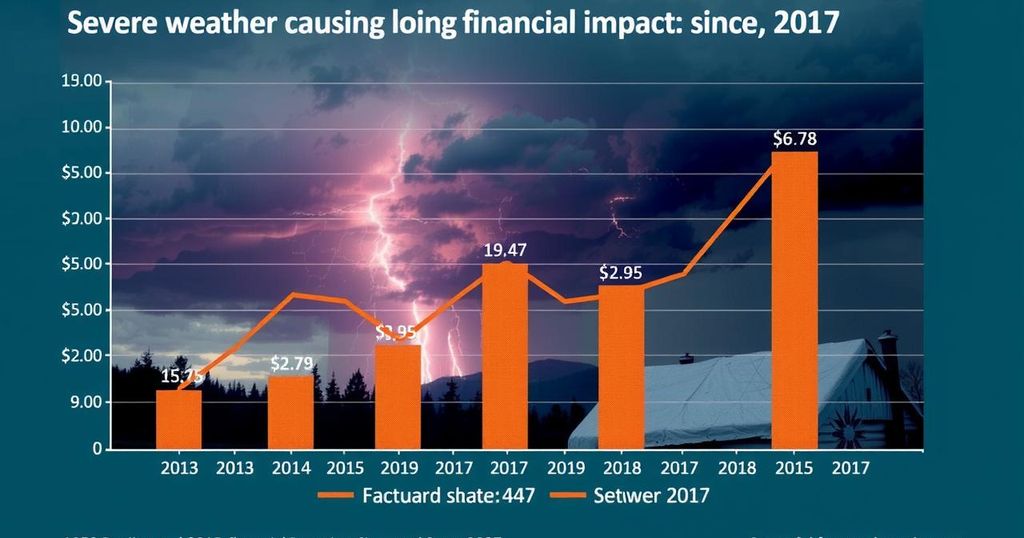Insured Losses Due to Extreme Weather Reach Record Highs in 2024
In 2024, insured losses from natural disasters surged to $140 billion, the highest since 2017, driven by hurricanes Milton and Helene, and extreme flooding in Dubai and Spain. This marks a significant rise attributed to climate change, with rising temperatures linked to more frequent and severe weather events. Insurers are reevaluating risk exposure as 11,000 lives were reported lost due to natural disasters last year.
Insured losses attributable to natural disasters reached an unprecedented $140 billion in 2024, representing the highest figure since 2017 and significantly exceeding the 30-year average. The report by Munich Re highlights that hurricanes Milton and Helene were the most financially destructive disasters in the United States, with Milton incurring $25 billion in insured losses and Helene causing $16 billion. Notably, extensive flooding events in Dubai and Valencia, Spain, where over 200 fatalities occurred, also contributed to substantial insurance claims.
As the year progresses, the Los Angeles area faces severe wildfires that may prove historically devastating. This surge in catastrophic events correlates with rising global temperatures, with the past year documented as the hottest on record, as reported by the European Union’s Copernicus Climate Change Service, indicating a 1.62°C increase above pre-industrial levels, thereby surpassing the critical 1.5°C threshold.
Tobias Grimm, Munich Re’s chief climate scientist, emphasized that “science has become more certain that climate change plays a crucial role in making weather disasters more frequent and more extreme.” The shift in climatic patterns has disrupted previous perceptions of weather norms, as illustrated by unexpected flooding in locations traditionally resistant to such events, including Dubai.
Grimm further remarked on the relationship between elevated temperatures and the rise in both intense rainfall incidents and tropical cyclone strength. In total, natural disasters resulted in damages amounting to $320 billion last year, the most substantial figure since 2021, with weather-related incidents accounting for 93% of total losses and 97% of insured losses. Approximately 11,000 lives were lost due to natural disasters in 2024, highlighting the human toll of these events.
Insurers have begun to recalibrate their risk assessments in response to the increasing frequency of extreme weather, withdrawing from certain high-risk areas. However, Grimm asserts that every risk can be insured “if you get the right premiums,” and Munich Re typically does not exclude regions based solely on climate change considerations.
The escalating frequency and severity of natural disasters have ignited concerns regarding their financial implications, particularly in the insurance sector. The rising temperature trends linked to global climate change are fundamentally altering weather patterns, leading to unprecedented weather events. This backdrop has intensified focus on how these disasters affect human lives, economic stability, and insurance practices, necessitating a reevaluation of risk and coverage strategies by insurers.
In conclusion, the substantial increase in insured losses from natural disasters in 2024, reaching $140 billion, underscores the urgent implications of climate change on weather-related events. The findings from Munich Re highlight a concerning upward trend in catastrophic occurrences, emphasizing the need for adaptive strategies within the insurance industry to address the challenges posed by this new climate reality. As extreme weather becomes increasingly pervasive, both financial and humanitarian responses must evolve accordingly.
Original Source: www.bnnbloomberg.ca




Post Comment